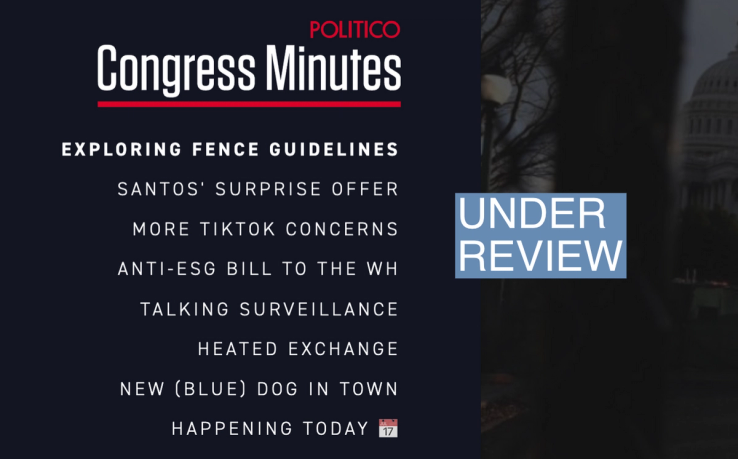The Scoop
One Monday in early January, the CEO of Politico, Goli Sheikholeslami, sat down to breakfast at the Four Seasons with Robert Albritton, who had sold the publication a year earlier to the German media giant Axel Springer.
At a nearby table was a jarring sight: The two Politico reporters who had quit to create the rival Capitol Hill newsletter Punchbowl News, Jake Sherman and Anna Palmer — breakfasting with a top executive at Axel Springer, Jan Bayer.
It was particularly awkward because that happened to be the morning that Politico executives were grumbling over my own reporting in Semafor that Punchbowl had “displaced…Politico, as Capitol Hill’s most important source of big news and process-y microscoops.”
Politico was rocked Thursday by the abrupt departure of executive editor Dafna Linzer after a year marked by strategic differences and personal conflicts with her new employer. Sheikholeslami, in an internal memo, sought to cast the moment as a chance to shake up the org chart, asking whether “we have the right editorial structure to deliver our ambitious strategy.”
But the high-profile personnel move comes at a moment of intense pressure for Politico, which faces intense competition for its core advertising business, a difficult market, and increasing pressure from its new parent company to perform. Its Playbook newsletter’s dominance on the Hill had been an anchor of the business, carrying the expensive advertising focused on Washington’s political class. But that’s part of why a series of ambitious startups (Semafor included) have focused intensely on serving Washington readers.
In this article:
Max’s view
I worked for Linzer for several months together at Politico after she arrived in April to replace Carrie Budoff Brown and before I left for Semafor in October. I found her to be charming and full of ideas, and she injected immediate energy (and anxiety) into the newsroom and reeled in some big-name talent.
But her role also proved divisive. In a series of internal emails on Thursday, Politico acknowledged that Linzer, who had previously been managing editor for politics at NBC News and MSNBC, and editor in chief Matt Kaminski had differences of editorial opinion that were leading to friction within the newsroom. Additionally, two sources said Linzer arrived expecting to replace Kaminski. It became immediately apparent that the company had different ideas about succession. According to two people familiar with the situation, Linzer began discussing resigning with Politico executives last October, after less than six months.
Her position at Politico was also becoming increasingly uncomfortable as complaints about her leadership were becoming public. Earlier this month, the Daily Beast reported a recent incident in which she brought a reporter to tears. Another Politico employee told Semafor that Linzer was also the subject of at least two complaints to the company from editors. (Linzer declined to comment on the claim.) Other publications smelled blood in the water: Reporters from the Daily Beast and Vanity Fair had begun calling around for stories focused on the executive editor and her polarizing leadership style.
But while Linzer’s departure may have had more to do with personality clashes than strategy, her hurried exit is also an indication of the growing pressure on Politico is under to find a winning formula in an increasingly crowded D.C. landscape and a new owner with its own priorities for growth.
Earlier this year, Politico executives ordered a review of the publication’s coverage of the race for the House Speakership. Members of both the business and editorial side of Politico participated in the review, which reflected negatively on Politico and determined that it had been beaten at various junctures by Punchbowl News.
Some Politico higher-ups conceded privately to Semafor that Punchbowl has taken a bite out of Politico’s business by becoming the first-read among Hill insiders for whom they had long been seen as the dominant player.
Linzer’s departure comes amid major changes to Axel’s business, and the importance of Politico in its US future. The company announced last month that it plans to open a New York office that will serve as its American headquarters, with Politico serving as its flagship US publication. Chief Executive Mathias Döpfner said Axel Springer plans to continue to expand in America, which includes Politico’s push to dominate news in California.
But there are some ominous signs. Axel Springer is phasing out print editions at several of its European newspapers, where there will also be buyouts and layoffs. As Semafor first reported, Insider, Axel’s first entry into the American media market, ordered a complete overhaul of its newsroom last fall, a move intended to encourage some employees to find new jobs. And just minutes before Politico announced Linzer’s departure on Wednesday, Morning Brew announced the second round of major layoffs in months.
Linzer and Politico executives declined to comment for this article.
Room for Disagreement
Politico remains hooked into the Washington bloodstream in a way that is difficult to replicate. As the co-author of West Wing Playbook, a newsletter about the White House, I saw how quickly many people with important jobs in the most famous building in Washington immediately opened our newsletter as soon as it hit their inboxes.
Sheikholeslami wrote in the internal memo that Thursday’s decision was meant to correct organizational structures that were “an outgrowth of various decisions over the years that may no longer be relevant.”
“The best organizations and businesses—especially in news media—constantly test their own assumptions, procedures, and structures,” Sheikholeslami said. “They evolve to changing environments and dynamics, take advantage of their opportunities, and use their resources creatively and smartly to drive more journalistic impact than the competition.”
NOTABLE
- After last month’s Wall Street Journal article announcing changes at Axel Springer, Dopfner sent an email to staff saying that the company’s US strategy was not changing.
- The Germany media CEO also said he plans to incorporate AI into some of the company’s newsgathering operations in the coming years.


